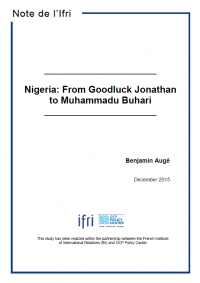Gateway to Think Tanks
| 来源类型 | Publications - Policy Papers |
| 规范类型 | 简报 |
| DOI | 978-2-36567-558-1 |
| Nigeria: From Goodluck Jonathan to Muhammadu Buhari Notes de l'Ifri, December 2015 | |
| Benjamin AUGE | |
| 发表日期 | 2015-12-18 |
| 出版年 | 2015 |
| 概述 | Nigeria has experienced a political changeover due to the presidential and parliamentary elections on 28 March 2015, enabling Muhammadu Buhari – a retired general who was in power between 1983 and 1985... |
| 摘要 |
Nigeria: From Goodluck Jonathan to Muhammadu Buhari Notes de l'Ifri, December 2015
Nigeria has experienced a political changeover due to the presidential and parliamentary elections on 28 March 2015, enabling Muhammadu Buhari – a retired general who was in power between 1983 and 1985 – to return to office. The deadline of 2015 represented for him a fourth attempt after his consecutive failures in the 2003, 2007 and 2011 presidential elections.  It is impossible to understand why Nigerians voted for him in recent elections if we do not review the presidency of Goodluck Jonathan. The latter led the country after the death of the acting president, Umaru Yar'Adua, before being elected in 2011. Therefore, he was in office from 2010 to 2015. This period, unique in many respects, largely explains why Muhammadu Buhari came to power. This paper will start with an analysis of Goodluck Jonathan's presidency, highly criticised in the West as well as in Nigeria. We will see that his personality, as well as his entourage did not particularly contribute to the success of his term in office. We will also examine the records of the former president: were these five years unsuccessful for the entire country, or did some sectors really manage to benefit from the growth of the new-born leading power on the continent, ahead of South Africa? The second objective of this paper is to provide a short-term prospective analysis, particularly drawing on Muhammadu Buhari's initial decisions and appointments. Specific attention will be given to the sectors which he has identified as priorities: the fight against Boko Haram, the fight against corruption and legal penalties against corrupt politicians. Finally, we will suggest analytical perspectives on how the current administration intends to manage both the fall in oil prices and the fact that the Federation does not have financial reserves.
Nigeria: From Goodluck Jonathan to Muhammadu Buhari
|
| 关键词 | Boko Haram Corruption Goodluck Jonathan Muhammadu Buhari Nigeria |
| URL | https://www.ifri.org/en/publications/notes-de-lifri/nigeria-goodluck-jonathan-muhammadu-buhari |
| 来源智库 | French Institute of International Relations (France) |
| 引用统计 | |
| 资源类型 | 智库出版物 |
| 条目标识符 | http://119.78.100.153/handle/2XGU8XDN/416104 |
| 推荐引用方式 GB/T 7714 | Benjamin AUGE. Nigeria: From Goodluck Jonathan to Muhammadu Buhari Notes de l'Ifri, December 2015. 2015. |
| 条目包含的文件 | ||||||
| 文件名称/大小 | 资源类型 | 版本类型 | 开放类型 | 使用许可 | ||
| couverture_note_ocp_(29KB) | 智库出版物 | 限制开放 | CC BY-NC-SA |  浏览 | ||
| note_ba_ocppc-ifri_e(260KB) | 智库出版物 | 限制开放 | CC BY-NC-SA | 浏览 | ||
除非特别说明,本系统中所有内容都受版权保护,并保留所有权利。